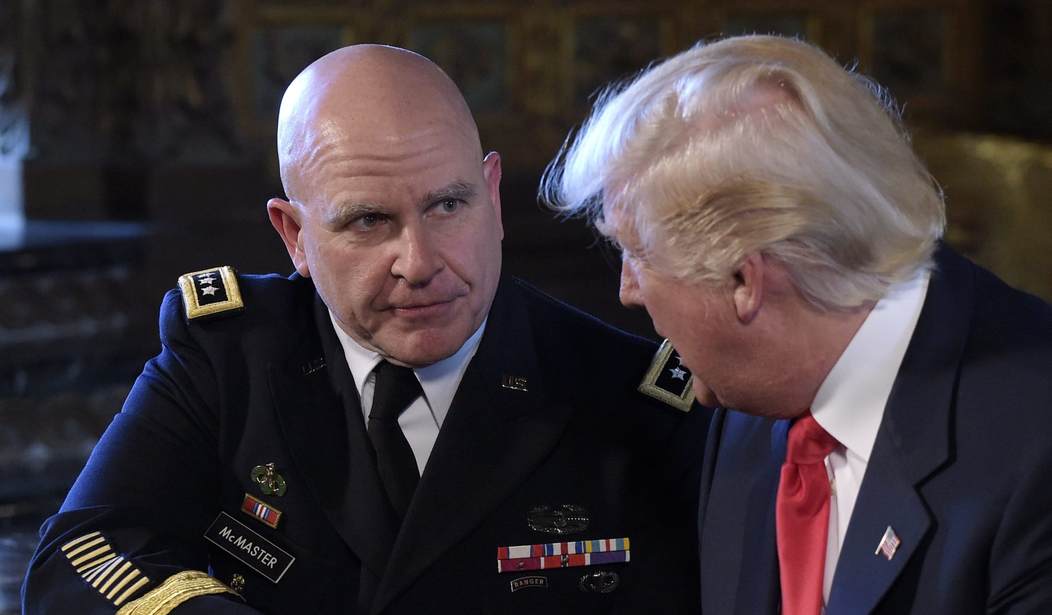H.R. McMaster, currently under attack from conservative critics, is best known for writing a book about the Vietnam War in which he put the blame primarily on the Johnson administration officials, but also excoriated military leaders for failing to challenge policies they knew, or should have known, were misguided. So no one should be surprised that the national security adviser is not inclined to salute and carry out instructions from the Oval Office, but challenges President Trump on matters ranging from personnel decisions to Iran policy.
The two categories are closely linked, since personnel IS policy, and the ongoing purge of NSC officials clearly contains a political dimension, which has been extensively documented. McMaster has recently fired several senior NSC officials—Rich Higgins, Ezra Cohen and Derek Harvey—who reportedly favored a tougher line on Iran than McMaster does. Their replacements come from the CIA, which traditionally has taken a pessimistic view of chances for changing the nature of the Tehran regime.
The political conflict extends well beyond the narrow issue of Iran policy. McMaster has instructed his staff to avoid using the phrase “radical Islamic terrorism,” and tried to remove it from the president’s recent speech in Warsaw, Poland (Trump put it back in). According to a recent rumor, the NSC declined to schedule a talk on radical Islamic terrorism by Ayaan Hirsi Ali, one of the country’s most respected authorities, reportedly because one of McMaster’s appointees, Mustafa Javed Ali, accused her of “Islamophobia.” McMaster’s predecessor, General Mike Flynn, advocated waging ideological war against “radical Islamists,” supporting moderate Muslims, and putting the United States firmly behind Muslim governments, such as Indonesia and Egypt, that fought the jihadis. McMaster does not agree.
This ideological component goes hand in hand with McMaster’s refusal to fire holdovers from the Obama NSC, and with his widely reported remarks to staff, arguing that there really are no holdovers, that everyone at the NSC is a professional civil servant, and that everyone is trying to do the best possible job. It’s a happy thought, but not widely shared in Washington. Those calling for his removal ask why Obama appointees are protected, while Trump loyalists are shown the gate.
Finally, as his critics have pointed out, McMaster not only challenges the president’s policy views, he has been known to disregard explicit instructions on personnel (Trump wanted Ezra Cohen to remain at his post as NSC intelligence chief, for example), and despite explicit presidential unhappiness with McMaster’s advocacy of sending large numbers of American troops to Afghanistan and Iraq, he continues to call for it, while he fights Trump’s wishes to declare Iran in violation of the nuclear deal, thereby ending the agreement.
It’s ironic that McMaster is now being attacked for doing what he has most famously and popularly advocated: challenging political policy makers, even his commander in chief, when he thinks they are on the wrong course. On the other hand, the National Security Council isn’t supposed to craft policy; its role is to manage policy implementation across the government. To be sure, people like McMaster have strong convictions and will invariably and properly express them. The question is whether he has crossed the line between good management and policy making.
Moreover, the recent personnel changes, seemingly reflecting an ideological conviction, raise the possibility that McMaster has violated his own call for dissenters to speak out. Those who were not in lockstep with McMaster’s own views are now looking for new jobs. Instead, the national security adviser who excoriated his predecessors for excessive compliance with their leaders’ policies now stands accused of firing those who were not compliant with his own preferences. This is not only in conflict with his own wise words about the Vietnam generation, but a bad way to shape policy. Good presidents and cabinet secretaries are best served by national security advisers who present them with a full range of views. Then the president decides, and the NSC is supposed to make sure that presidential decisions are indeed carried out. The NSC can’t fulfill its mission if dissenting views aren’t heard. Of late, dissenters have been fired, and the boss insists that the survivors toe his line.









Join the conversation as a VIP Member